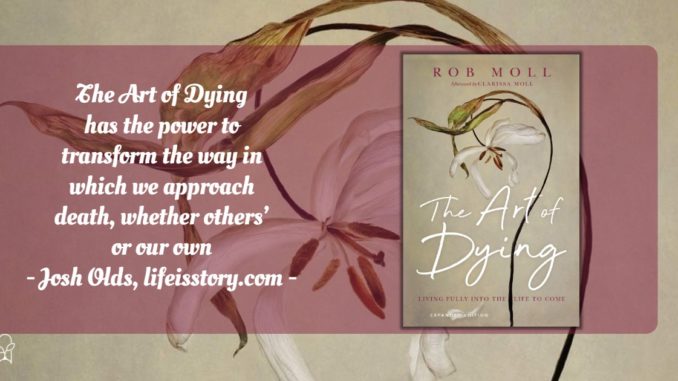
Published by IVP on April 6, 2021
Genres: Non-Fiction, Christian Life
Buy on Amazon
Goodreads

Death will come to us all, but most of us live our lives as if death did not exist. Medicine has made dying more complicated and more removed from the experience of most people. Death is partitioned off to hospital rooms, separated from our daily lives. Most of us find ourselves at a loss when death approaches. We don't know how to die well. For centuries Christians have prepared for the "good death" with particular rituals and spiritual disciplines that direct the actions of both the living and the dying. In this well-researched and pastorally sensitive book, Rob Moll explores the Christian practice of dying well. He gives guidance for those who care for the dying as well as for those who grieve. This book is a gentle companion for all who face death, whether one's own or that of a loved one. Christians can have confidence that because death is not the end, preparing to die helps us truly live. A decade after writing this book, Rob died in a hiking accident at age forty-one. This edition includes a new afterword by his wife, Clarissa Moll, reflecting on Rob's life, death, and legacy.
When I think of a good death, there is a phrase and a person who comes to mind. The phrase comes from Scripture, one repeated five times throughout the Old Testament: “old and full of years.” The person is my grandmother. Her death could be a model for the death marked out in The Art of Dying. She made her final arrangements. She spoke to all her family. Our last conversation began “I’m going to die soon and I wanted to talk to you about my funeral.” She died the day after her Social Security check for the month deposited. On the end table, she’d written. “I won’t be needing that last check” followed by an itemized list of where to give the money away. It was a good death.
In The Art of Dying, Rob Moll laments that this is a death that has largely been lost. We cling to life with everything, extend it at all costs, with the end result that death is often seen as a lost fight than a baptism into a new life. Moll walks readers through the history of death and bereavement, noting how our theology of death has changed over time. We have become more distant and more removed from it. The church has become less involved. We have no concept of “Christian dying” and, therefore, our view of death is skewed.
Moll tells readers that they need to not be afraid of discussing death, that they should make their wishes surrounding end of life care be not just in a legal document but a known, stated, and shared belief with one’s family. He moves us back to a concept of death that is communal and shared, rather than sterile and individualistic. He points to churches as the lost anchors of this point of care—both leading up to and in the aftermath of death.
The Art of Dying is about learning to die well, to hold this life loosely in favor of the life to come, and how to aid and comfort the grieving. Moll gives us a transformational view of death that takes something ugly and brutal and, without denying that obvious reality, shows us the beauty and gentleness that can come from it as well.
Tragically, Moll’s writing proved necessary for his own family and community. In 2019, ten years after the book’s first release, Rob Moll was killed when he fell off a cliff while hiking. He was forty-one. Not the death he wrote about—full of years and in old age after a long decline—but a death sudden and tragic. And yet, his preparations and his principles stand true. His wife, Clarissa, writes in the afterword “I will be grateful always for the preparation that Rob insisted on…Rob prepared well for his death. And out of his amazing love for me, Rob prepared me well too.”
The Art of Dying needs to be on the shelf of any pastor, funeral director, hospice worker, or caretaker. It has the power to transform the way in which we approach death, whether others’ or our own. We live in the light of death. We live in a culture of resurrection. O death, where is thy victory; grave where is thy sting?
